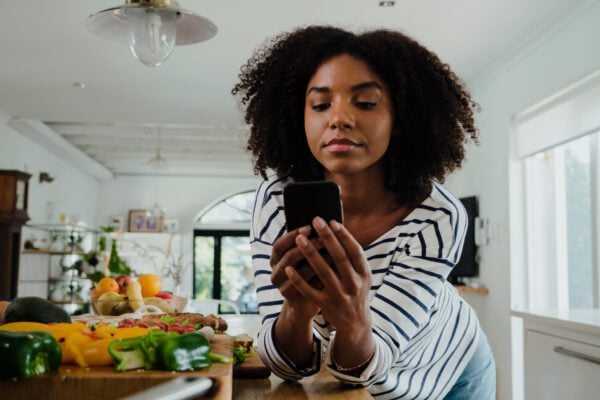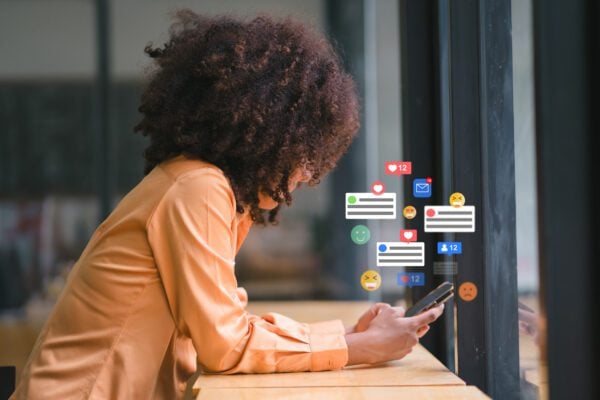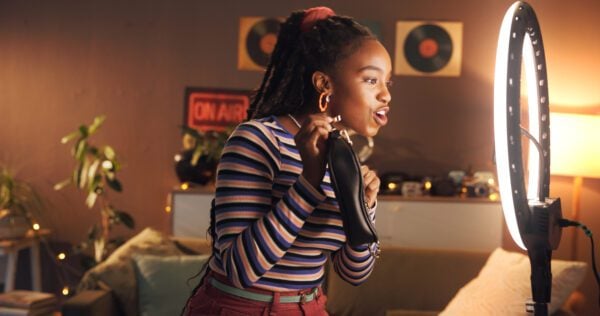Are Black girls being affected by their online social-media use? Experts say yes.
In part one of this series, we explored how social media created new pressures around appearance and belonging for Black youth. That installment highlighted how the constant exposure to edited images, influencer culture and algorithm-driven content creates a twin threat: heightened body-image insecurity and a sense of invisibility when one’s own body doesn’t match the feed.
For years, eating disorders have been mischaracterized as issues that primarily affect white women. Clinicians and advocates now say that assumption is both false and dangerous, leaving many Black people undiagnosed, untreated and invisible in conversations about body image and mental health.
At the same time, social media — often praised for creating connection and representation — is being scrutinized for its role in amplifying unrealistic body ideals and fueling disordered eating. Experts warn that the combination of underdiagnosis and overexposure to harmful online content creates a unique risk for Black youth and women.

The growing link between screens and self-image
Social media’s influence on eating habits and self-perception has been well documented. A 2023 scoping review published in PLOS Global Public Health found that social media use “is a plausible risk factor for the development of eating disorders” among young people, particularly those between 10 and 24 years old. According to the study, frequent exposure to highly curated and filtered images online fosters social comparison and body dissatisfaction.
“Through the lens of social media, someone else can always look better, skinnier or prettier.”
“Through the lens of social media, someone else can always look better, skinnier or prettier,” said Alexandra Dane, a lead author of the University College London study. “The outcome is a population of young people at risk of corroded body image, gaping discrepancies between their actual and ‘polished’ online selves and an increased likelihood of engaging in compensatory disordered eating behaviors.”
The study’s authors called for greater “recognition, funding, research and prioritization” to protect vulnerable users, especially those from marginalized communities.

Disparities in diagnosis and care
According to the National Eating Disorders Association (NEDA), Black, Indigenous and other people of color are significantly less likely to be diagnosed with eating disorders even when they show symptoms similar to or more severe than their white peers. Experts attribute this gap to cultural stigma, a lack of culturally competent clinicians and a persistent stereotype that eating disorders are “white women’s illnesses.”
“Providers are still influenced by stereotypes about who gets an eating disorder,” said Liz, Thompson, NEDA spokesperson. “That bias delays diagnosis and means many people of color are not getting the help they need until the illness has progressed.”
“Providers are still influenced by stereotypes about who gets an eating disorder,” said Liz, Thompson, NEDA spokesperson. “That bias delays diagnosis and means many people of color are not getting the help they need until the illness has progressed.”
Clinicians also note that symptoms may present differently across cultures. Some Black patients, for instance, may not express body image concerns in the same way as white patients or may frame their experiences around health, spirituality or stress. Without culturally informed screening tools, these nuances can be missed.
When the algorithm turns harmful
Social platforms such as Instagram, TikTok and YouTube can serve as both refuge and risk. While they offer spaces for Black creators to celebrate beauty, fitness and natural hair, the same feeds can flood users with “thinspiration” or extreme diet content.
In a 2024 TIME magazine report, 22-year-old Caroline Koziol described how an algorithmic spiral of “fitspo” videos and diet challenges deepened her eating disorder. Koziol is among several plaintiffs suing major tech companies, alleging their recommendation systems exposed her to harmful content that worsened her illness.
Meta, which owns Instagram and Facebook, announced in a 2024 statement that it would begin hiding posts related to self-harm and eating disorders from teen accounts and restrict searches for certain terms. “We want teens to have safe, age-appropriate experiences on our apps,” the company said. Critics argue the measures do not go far enough.

TikTok has also tried to curb harmful trends by banning searches for #SkinnyTok, a tag associated with extreme weight loss videos. According to a statement from the platform, users searching those terms are now redirected to mental health resources. But advocacy groups say algorithmic exposure remains a problem.
Cultural pressures compound the harm
Experts say Black youth face an added layer of pressure. Historically, beauty standards in Western media have centered white, thin, Eurocentric features — ideals that continue to dominate many online spaces. According to researchers, that exclusion can intensify internalized racism and self-comparison among Black users.
“Representation matters, but it’s not enough to just exist online,” said Dr. Joy Cox, an author and body image researcher quoted in Psychology Today.
“Representation matters, but it’s not enough to just exist online,” said Dr. Joy Cox, an author and body image researcher quoted in Psychology Today. “When the algorithms elevate one kind of beauty, it tells everyone else they don’t belong. That has real consequences for mental health.”
Community advocates also say Black people who do seek help may face dismissal or misdiagnosis. Clinicians may overlook signs of anorexia or bulimia in patients who don’t fit the “underweight white female” stereotype, leading to delayed care and worse outcomes.
What the research shows about solutions
Studies show that even modest reductions in social media use can improve self-image and mental well-being. According to a 2023 study from the American Psychological Association, young adults who halved their daily social media use for just three weeks reported “significant improvements in appearance satisfaction and weight esteem.”
“This finding doesn’t mean social media is inherently bad,” said lead researcher Dr. Gary Goldfield. “It shows that being mindful about how much time we spend online and what content we consume can have measurable benefits for mental health.”

Experts recommend a multipronged approach to prevention that includes improving digital literacy education in schools, promoting algorithmic transparency and investing in culturally competent care. Public health researchers also emphasize the importance of community-based outreach and early intervention.
According to NEDA, expanding access to diverse treatment providers and encouraging culturally informed screening are essential steps. The organization also encourages families to have open conversations about body image and the influence of media on their children.
Moving forward
Eating disorders remain complex illnesses shaped by biology, psychology and environment. Social media is not the sole cause, but it is a powerful factor that can heighten risk — particularly for young people who are already vulnerable.
For the Black community, experts say the intersection of cultural bias, limited access to care and the relentless pressure of online beauty standards demands urgent attention.
As Dane and her fellow researchers noted in the UCL study, the goal is not to disconnect from the digital world but to use it more wisely. With awareness, education and representation, the same platforms that once distorted perceptions of beauty could one day help rebuild them.
Resources that can help
Charis Center for Eating Disorders — 6640 Intech Blvd, Indianapolis, IN 46278. Offers comprehensive treatment for adolescents and adults, including outpatient, intensive outpatient and partial-hospitalization programs. Phone: 317-295-0608.
IU Health Eating Disorders Program — Age-specific groups, intensive outpatient and partial hospital programs. Treatments address physical and emotional aspects of disordered eating.
Northside Mental Health (Eating Disorder Treatment) — Indianapolis clinic providing individual and family therapy for anorexia, bulimia, binge-eating and other disordered-eating patterns.
NEDA Helpline — The National Eating Disorders Association provides referral and support services. Visit nationaleatingdisorders.org for national assistance.
The Renfrew Center for Eating Disorders — offers a virtual BIPOC support group for people questioning if they have an eating disorder or who are in recovery, held weekly on Tuesdays at 6 p.m. ET.
ANAD (National Association of Anorexia Nervosa and Associated Disorders) — maintains a “Black community mental health resources” list and specifically mentions a free BIPOC peer-support group aimed at eating disorders and body-image concerns.
This reporting is made possible by a grant from the Indianapolis African-American Quality of Life Initiative, empowering our community with essential health insights. https://iaaqli.org/
Contact Health & Environmental Reporter Hanna Rauworth at 317-762-7854 or follow her on Instagram at @hanna.rauworth.
Hanna Rauworth is the Health & Environmental Reporter for the Indianapolis Recorder Newspaper, where she covers topics at the intersection of public health, environmental issues, and community impact. With a commitment to storytelling that informs and empowers, she strives to highlight the challenges and solutions shaping the well-being of Indianapolis residents.








